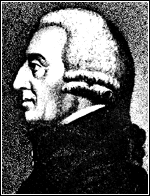|
| ||
|
Adam Smith was a philosopher and professor at the University of Glasgow. His Inquiry into the Nature and Causes of the Wealth of Nations (1776) is one of the most influential works of modern history. The work's significance is so great that Smith is considered the founder of the study of economics, and his theories are still applicable today. Smith was born in Kirkcaldy, Fife, and raised by his mother, Margaret Douglas. His father, Comptroller of Customs in Kirkcaldy, died before Smith was born. Smith began his education at the University of Glasgow at the age of 14. He demonstrated a talent for math and physics, but his interest was in philosophy, to which he applied his analytical skills and tireless inquiry for the rest of his life. He later studied at Oxford, although he professed not to like the education provided at the famous university, and later returned to Scotland to lecture in Edinburgh.
Following his position at the University of Glasgow, Smith became tutor for the third Duke of Buccleuch in France and Geneva, where he met Voltaire and other philosophers. Perspectives gained during this time inspired Smith's work on Wealth of Nations. Smith's writing emphasized the achievement of the greatest happiness for the greatest number. It called for a reduction in regulations governing industry, increased free trade, and fiscal reform, defining and establishing the concept of laissez-faire capitalism. Smith argued that, if left up to themselves to "truck, barter and exchange," a general economic prosperity would result. He is credited with a great faith in individualism. In 1778, Smith was appointed to a post of commissioner of customs in Edinburgh. Among his friends in Edinburgh were medical scientist Joseph Black and geologist James Hutton. Black and Hutton would act as his literary executors, burning many of Smith's papers at his request. His library survives, mostly divided between the University of Edinburgh, and the Faculty of Economics at Tokyo University. Smith died in July of 1790, shortly after completing the sixth edition of his Theory of Moral Sentiments. After his death, executors discovered that this father of economics had secretly contributed much of his income to charity. | ||
|
| ||
Thursday, December 26th, 2019
Attention visitors: Tartans.com is back. Please note that this is a snapshot of the site as it existed nearly 20 years ago and you may encounter broken links; we are still combing through the site and correcting those as we find them. Please also note that some sections are currently not functional, primarily the discussion forums/clan chat boards.
|
** HOME - First Time Visitors - Glossary - - Contact Us ** Awards | Bibliography | Clan Calendar | Clan Chat | Clan Finder | History | Famous Scots | Genealogy | Great Hall of the Clans | Links | News and Features | Scots on the Net | Search | Site Map The Gathering of the Clans
Copyright 1995- Tartans.com - All Rights Reserved. |

 Smith gained fame as an intellectual in 1759, with the publication of The Theory of Moral Sentiments, which was based on his lectures from Edinburgh and Glasgow, where he was Professor of Logic and then Professor of Moral Philosophy for thirteen years. Smith described this as the happiest period of his life. Here, he became friends with philosopher David Hume, and kept company with Glasgow merchants who gave him insight into the practical aspects of the economy.
Smith gained fame as an intellectual in 1759, with the publication of The Theory of Moral Sentiments, which was based on his lectures from Edinburgh and Glasgow, where he was Professor of Logic and then Professor of Moral Philosophy for thirteen years. Smith described this as the happiest period of his life. Here, he became friends with philosopher David Hume, and kept company with Glasgow merchants who gave him insight into the practical aspects of the economy.